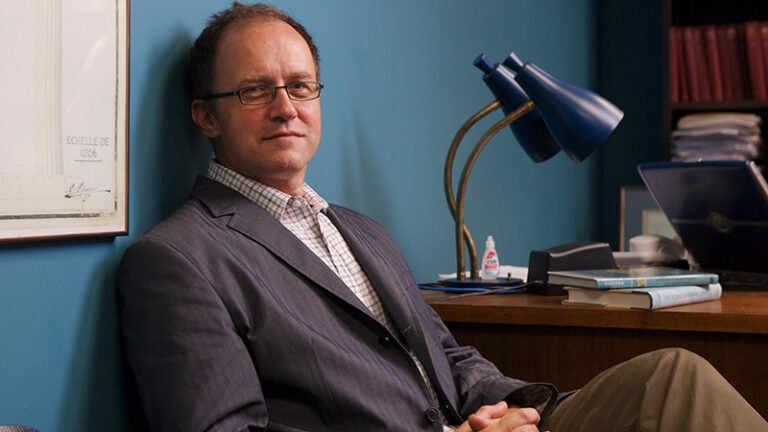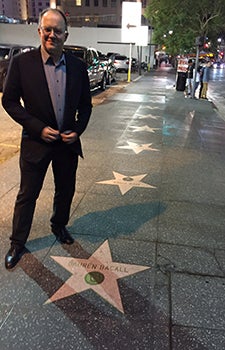
In Memoriam: Thomas Habinek
Dean’s Professor of Classics Thomas Habinek, the former longtime chair of the Department of Classics who produced groundbreaking scholarship on Roman rhetoric, literature and philosophy, died Jan. 19.
A highly respected academic known for turning his powerful intellect to the good, Habinek, who served as the Classics Department chair for 15 years through 2017, was 65. He was diagnosed in 2006 with stage-four liver cancer, but for more than a decade the disease stayed in remission.
The cancer relapsed aggressively in December 2017, but Habinek continued teaching through the 2018 Fall semester, said Hector Reyes, USC Dornsife assistant professor (teaching) of art history and Habinek’s registered domestic partner for the last 16 years.
“As a teacher, he had a gift not so much of directing his students as of eliciting new ideas from them,” said William “Greg” Thalmann, professor of classics and comparative literature who succeeded Habinek as chair of the department.
Born on Christmas Day 1953 in Cleveland, where he grew up, Habinek had a restless intellect that continued to move on to new challenges, from old-school classical philology to the politics of Latin literature, from anthropology to the issue of diversity throughout the ages.
“He was never content to be ‘the expert,’” said Reyes, who at the time of his partner’s passing was collaborating with him, for the first time, on a book, Methodical Fire: The Physics of Art and Art Theory, from Zeno to Baudelaire.
A private man who was serious but also fun, Habinek is survived by his twin 37-year-old children: Nadja Habinek, a criminal defense attorney in Los Angeles, and Jacob Habinek, a postdoctoral researcher at the Institute for Analytical Sociology in Norrköping, Sweden.
Memorial services will be held at 1:30 p.m. on Feb. 2 at Blessed Sacrament Catholic Church, 6657 Sunset Blvd., L.A.
‘Enormous’ contributions

Thomas Habinek on the Hollywood Walk of Fame. Photo courtesy of Hector Reyes.
After earning his undergraduate degree in classics from Princeton University in 1975, Habinek went to Harvard University, where he earned, in 1981, his doctorate in classical philology.
Habinek was a Bruin for a short time; he got his first teaching job at UCLA after leaving Harvard. He went on to teach at the University of California, Berkeley, but his love of L.A. brought him to USC in 1992 as a professor of classics. He would remain a Trojan the rest of his life.
“I am saddened to lose such an extraordinary scholar, teacher and friend,” said USC Provost Michael Quick. “Tom was a deeply talented thinker and writer, and the university will miss his enormous contributions. I will miss most our thoughtful conversations and his wise counsel.”
Habinek had enormous intellectual range and developed new and illuminating approaches to every one of the many topics he took on, Thalmann said.
“He has left a significant mark on the discipline through the many graduate students he trained and inspired as well as through his writings,” Thalmann said. “As a colleague, he was indispensable. He played a central role in building the Classics Department to what it is today and bringing it to national stature.
“He was outstandingly generous, intellectually and in other ways, to his colleagues and students. His departure is a severe blow to us all.”
Robin Romans, associate vice provost, who worked with Habinek for over a decade in USC Dornsife’s Thematic Option Program, said he was always thoughtful of others, particularly his students.
“He always looked for the best in others and their comments,” Romans said. “He was a mentor to me, without ever trying or knowing it. He was a trusted friend who embodied the best of the university.”
Habinek was a familiar face and name to Trojans. Over his more than 25 years at USC, he developed a devout following of undergraduate and graduate students. For several years, he opened USC Commencement ceremonies by reading the traditional charge in Latin and Greek.
Outside of his scholarly life, Habinek enjoyed playing classical music on the piano.
His books and articles include topics on Latin literature, Roman cultural history, classical rhetoric, and natural scientific approaches to ancient art and literature.
Among the many awards Habinek received are two fellowships from the American Council of Learned Societies and the Associates’ Award for Excellence in Teaching, USC’s highest teaching honor.
Student of Stoicism
In the introduction to his book Cicero On Living and Dying Well (Penguin Classics, 2012) about the great Roman orator and statesman, Habinek wrote that Cicero’s central issue is whether death is bad.
Based on Cicero’s philosophy, Habinek wrote that “death is nothing to fear and may even be a positive thing.”
Reyes recalls something Habinek did before undergoing liver surgery in 2006.
“This was less than a week before he had to have almost all of his liver removed,” Reyes recalls. “It was not certain whether the surgery would be a success, and we were prepared for the worst outcome.”
Reyes recalls that Habinek felt a need to repaint the walls of the Classics Department and get new furniture.
“He wanted to leave them with beauty,” Reyes said. “He painted the walls in rich, immersive colors, a deep blue and emerald green, while I assembled furniture. It was hard work and it was a truly Stoic gesture, and not only because his response to possible impending death was hard work for the benefit of others.
“As a student of Stoicism, he understood that beauty is the material form of truth, a shared experience of order that exceeds the self. This Stoic attitude perfectly captures him.”